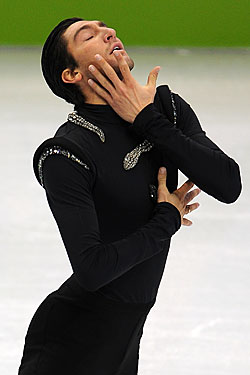
Last night, when Evan Lysacek learned he had won the Olympic gold, edging out his Russian rival Yevgeny Plushenko by 1.31 points, he looked both thrilled and relieved. When we met him back in December, Lysacek ran down his training routine for us: “Weight training and biometrics every other day, cardio every other day, and ballet once a week. I usually hike on the weekends, and I do all my balance warm-up and cool-down stuff every day for an hour, and then I do court training every day for an hour.” It paid off during last night’s performance, when his back-loaded routine edged out Plushenko’s.
Many skaters can’t handle the pressure of a high-stakes competition like the Olympics. U.S. champion Jeremy Abbott fell apart during his short program, as did Canadian champion Patrick Chan. Lysacek says he’s developed a system to overcome his nerves, which we can only imagine he indulged in last night in the Olympic village. “When I’m getting ready in my room, I drink the same thing, I light the same good-luck candle I have — it’s a brand from England called Cire Trudon — I listen to the same playlist, with songs from Jay-Z to the Virgins or the Killers, happy music that will keep my emotions even and not get my heart wildly pumping. I’m engaging all my senses, telling my body, ‘Okay, it’s time to go to that place.’ When I get to the rink, I go through pretty much the same warm-up off the ice every time, so my body is continuing to get into that super-focused mentality. About twenty minutes before I go on, I put my suit and my skates on — that’s my alone time — and I talk to myself. Self-talk is very important to me,” he says. “I try to conjure really difficult days, days when I was sick or jet-lagged and felt horrible, and then think, If I can get through that, I can get through anything.”
Lysacek’s most grueling professional test came at the Turin Olympics. After finishing tenth in the short program, he contracted a bacterial infection and spent the day in the Olympic Village medical clinic. “I was like, ‘Send me home, send me home right now, I don’t want to be here anymore, I want to be in my own bed,’ and they were giving me all these injections, but my veins kept collapsing because I was so dehydrated,” he says. He wanted to withdraw from the competition, but coach Frank Carroll wouldn’t let him. “He goes, ‘Just think about what you’re doing — this is your entire life — think about how many people and how many steps it took to get on the team and you’re going to give it up because you don’t feel well? Okay, it’s up to you.’ And when someone says that to you, you’re like, of course I’ll compete.” He skipped practice the next morning but skated the long program on adrenaline, performing one of the best routines of his career, and placing fourth overall. “Going to Vancouver, I’m like, hit me with your best shot, throw it on me, because I have the experience that is going to help me with that hit. That gives me power,” he said at the time. His steady, clean long and short Olympic programs were reflective of his training and will. And now he’s won his gold, the first American man since 1988 to do so.